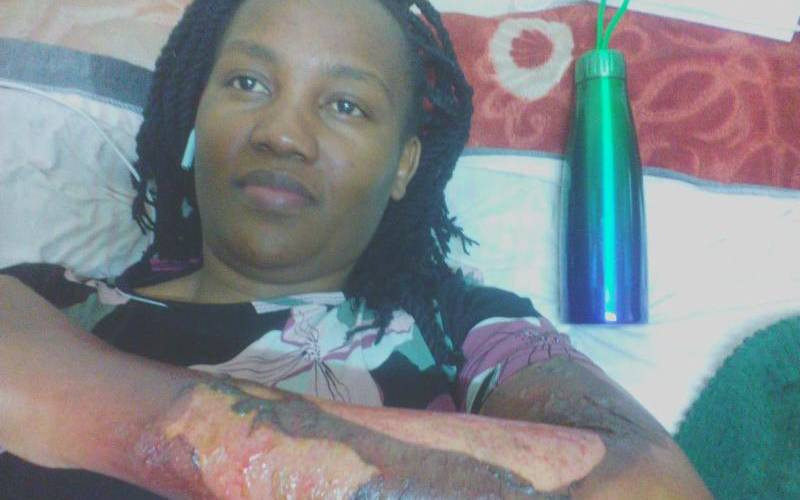 |
|
Activists protest against racism outside the Taylor House Immigration and Asylum Tribunal Court in London. [PHOTO: COURTESY] |
Africans and other ethnic minorities suffer from discrimination in the UK when it comes to jobs and services, and even laws have failed to halt racism. Is Britain fighting a losing battle against prejudice? SHAMLAL PURI reports on recent cases involving British Africans
Max Kpakio, an ordinary African looking for a job in the UK, found himself a victim of racism when he applied for an ordinary job at Virgin Atlantic, the British airline, at their Swansea office in Wales.
The 36-year-old Liberian refugee, an International Relations graduate from Swansea University, applied to work in one of the travel company’s call centres under his African name, but was rejected at the initial stage.
Kpakio, a British citizen, was baffled by the rejection because he thought he had provided a good CV. It then dawned on him that the rejection could have been due to his ethnic name. He reapplied for the post under the traditional British name of Craig Owen, sending only a simplified version of his original CV. He got an enthusiastic response and was invited for an interview. Virgin phoned him as Craig Owen several times, saying how they looked forward to meeting him. He did not return their calls.
Equal opportunities
Kpakio was convinced that his first application was rejected solely on racial discrimination. He has taken the airline to an employment tribunal, accusing them of racial discrimination. The case will be heard in Cardiff, Wales, this month.
Virgin Atlantic, founded by the flamboyant tycoon Richard Branson, has denied it had discriminated against Kpakio, and stressed that it is an equal opportunities employer.
Discrimination against ethnic minorities is not new in the UK: Job applicants with foreign-sounding names are often rejected. Identical CVs from two sets of names, British and foreign, have shown there is more likelihood of the former being received positively by employers.
In spite of this, Britain has come a long way in tackling prejudice. Racism was at its worst in the 1950s and the 1960s, when immigrants were refused services and landlords hang signs declaring, “No Blacks”. Happily, we do not have that kind of audacious racial prejudice in the UK these days.
But this is not to say that it does not exist. Recently, an Englishman rang a radio phone-in programme, making insulting remarks about non-whites. When the radio host interrupted and accused him of being a racist, the caller haughtily replied, “Yes, I am.”
It is such people who are the bane of Britain’s multi-cultural society.
Britain has tough anti-racism laws, which help to keep public discrimination at bay, but they cannot guard against people’s racist vitriol in their private moments.
White Britons in power hide behind institutionalised racism, a syndrome that refuses to go away.
Even members of minority groups who get jobs find their positions threatened by discrimination.
The United Kingdom employment equality law prohibits prejudice-based actions in the workplace. The fact that it is unlawful to discriminate against people on the basis of race, religion, and sexual orientation, who form part of ‘protected characteristics’, is an integral part of the UK labour law.
Stay informed. Subscribe to our newsletter
The Equality Act of 2010 outlaws discrimination in employment, education, and public services, among others. It is unlawful to discriminate against someone ‘from protected characteristics’ or treat the person less favourably than another on grounds of colour or race.
The British Refugee Council, a charity, was ordered to pay a former employee, Tanzanian-born Zaina Ukwaju, £30,000 (about Sh3.8 million) in compensation after a tribunal ruled that it was guilty of racial discrimination when it sacked the only two Africans working at an immigration centre.
Ukwaju, who lives in London, won the claim for racial discrimination, victimisation and unfair dismissal after losing her job as a detainee adviser at the Oakington Immigration Centre in Cambridge. She was dismissed with Nigerian-born colleague Emmanuel Obikwo, who also won a racial discrimination case against the council and was awarded compensation.
Consciously biased
Both the Africans were picked for redundancy after the Home Office announced plans to close the centre in May 2006. But despite the closure plans being put on hold, Ukwaju and Obikwo were dismissed five months later.
The employment tribunal was told there were no ethnic black workers at Oakington. Tribunal chairman Brian Mitchell said white staff members with less service were retained over the two Africans.
Ukwaju and Obikwo accused the council’s operations manager Anne-Marie Leech of being ‘consciously biased’ when selecting staff for redundancy.
The National Health Service employs nurses from Kenya and other parts of Africa. They do a brilliant job in the beleaguered and financially starved British health service, but their enthusiasm and professional abilities are often stunted by stigma and prejudice.
South Africa has the highest number of nurses working in the UK — just over 2,200. There are more than 200 from Kenya while others are from Nigeria, Ghana, Zambia and Zimbabwe.
The UK must accept that it has problems with racism and do even more to tackle it. The contribution of Britain’s Africans and other foreigners to the economy cannot be underestimated, but it will take a long time for them to be treated equally and with dignity.
 The Standard Group Plc is a
multi-media organization with investments in media platforms spanning newspaper
print operations, television, radio broadcasting, digital and online services. The
Standard Group is recognized as a leading multi-media house in Kenya with a key
influence in matters of national and international interest.
The Standard Group Plc is a
multi-media organization with investments in media platforms spanning newspaper
print operations, television, radio broadcasting, digital and online services. The
Standard Group is recognized as a leading multi-media house in Kenya with a key
influence in matters of national and international interest.
 The Standard Group Plc is a
multi-media organization with investments in media platforms spanning newspaper
print operations, television, radio broadcasting, digital and online services. The
Standard Group is recognized as a leading multi-media house in Kenya with a key
influence in matters of national and international interest.
The Standard Group Plc is a
multi-media organization with investments in media platforms spanning newspaper
print operations, television, radio broadcasting, digital and online services. The
Standard Group is recognized as a leading multi-media house in Kenya with a key
influence in matters of national and international interest.









